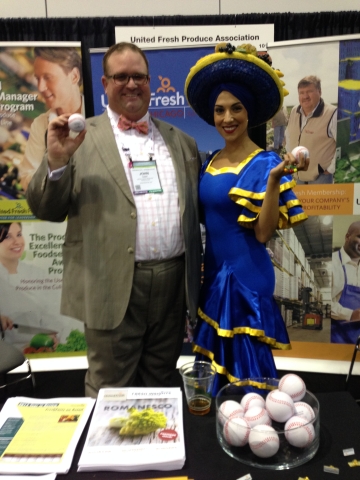Promoting a Show at a Show Is a Good Return on Investment

John J. Toner V, vice president, convention and industry relations at United Fresh Produce Association, may spend up to 100 days on the road every year promoting his organization and its trade show, but the time on planes, in hotels and on showfloors is worth the return on investment.
“The trade show is the primary revenue generator here and (promoting the show on the road) is the only way I know how to really drive revenue,” Toner said.
He added, “I can sit here in D.C. until I am blue in the face sending e-mails or even have people cold call, but it’s not the same.”
Jim Wulfekuhle, who is vice president of sales and marketing for IWF Atlanta (International Woodworking Fair) and also spends a lot of time promoting his show far and wide, agrees, adding, “You have to do it. You have to spend the money and look at it that you are building relationships.”
Toner said his organization exhibits in trade shows in the United States and overseas with the primary goal of not only selling exhibit space for the show, but also meeting new potential attendees, selling memberships and finding new partners.
“I don’t know how you could go to another event without being an exhibitor,” he added. “I would feel like a carpetbagger.”
Wulfekuhle said the goals for IWF have shifted as to why they exhibit in other shows, including their main competitor – AWFS in Las Vegas.
“It used to be we would exhibit to sell exhibit sales,” he added. “Now, we are really solidifying relationships with other organizers.”
Going overseas also has been an important strategy for both United Fresh and IWF Atlanta.
Wulfekuhle said he recently was out of town eight weeks in a row, traveling to Bogota, Columbia, to exhibit at a show down there, as well as several other locales in the U.S.
He added that they also go to Mexico City for an event. “Latin America is important for us,” he added. “We are planning to attend even more international events in the future.”
United Fresh also travels to several overseas events, including Messe Berlin’s Asia Fruit Logistica in Hong Kong and Fruit Logistica in Berlin, as well as events in Latin America.
“I’d like to do more trade shows both domestically and internationally when it makes sense to do so.” Toner said. “It’s a visibility factor. If we didn’t have a booth, we wouldn’t be visible.”
He added the most important aspect of going to any show was doing the follow up afterward and the homework beforehand to make sure he’s making and maintaining connections with the people he needs to.
Besides going to other shows, United Fresh also has its Fresh Impact Tour, a regional event that moves around the U.S. to promote both its smaller D.C.-based event and its annual show. “We go to member-rich locations,” Toner said.
He added they host lunches and give talks to up to 60 people at a time and sometimes make up to three or four member visits a day. “We’ll touch close to 100 members in a week,” Toner said.
Wulfekuhle said the toughest part of all of the traveling was being away from his family, but he added that the difference after you meet someone face-to-face was “night and day”, especially internationally, so in the end, it was good for business.
Toner also said going on the road was a necessity to promote his show and organization. “A lot of times, I see things on a showfloor that leads to other business,” he added, “I’m judged on the success of our convention … It’s important to get in front of people.”
United Fresh is coming up June 10-13 at Chicago's McCormick Place, and IWF Atlanta is on tap Aug. 20-23 at the Georgia World Congress Center in Atlanta.


Add new comment